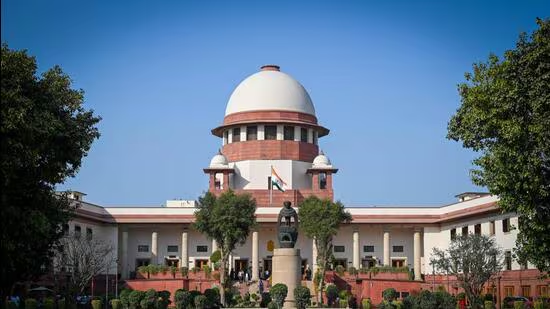Description

Copyright infringement not intended
Picture Courtesy: https://www.hindustantimes.com/india-news/ninejudge-bench-hears-if-states-can-regulate-industrial-alcohol-101712082525926.html
Context: The case before the Supreme Court's 9-judge bench revolves around a crucial constitutional question: whether states possess the authority to regulate and impose excise duty on industrial alcohol, or if this jurisdiction is exclusively vested with the Central government.
Details
- Excise duty on alcohol, including liquor meant for consumption, is a major source of income for state governments. However, industrial alcohol, which is not for drinking and has various industrial applications, currently falls outside this revenue stream. States are keen to explore if they can extend their taxing power to industrial alcohol to boost their coffers.
Legislative Framework
- State List (Seventh Schedule): Entry 8 grants states powers to legislate on "intoxicating liquors", traditionally referring to alcoholic beverages meant for human consumption.
- Union List (Seventh Schedule): Entry 52 empowers the Central government to regulate industries deemed expedient in the public interest.
- Concurrent List (Seventh Schedule): Entry 33 allows both states and the Centre to legislate on industries, with central laws prevailing over conflicting state laws.
|
Industrial Alcohol vs. Intoxicating Liquors
●Industrial alcohol, utilised as a raw material in manufacturing processes, is distinct from alcoholic beverages intended for human consumption.
|
Evolution of Legal Precedents
- Synthetics & Chemicals Ltd v. State of Uttar Pradesh (1989): The Supreme Court ruled that states' powers under Entry 8 are restricted to regulating "intoxicating liquors", excluding industrial alcohol. Taxes and levies on industrial alcohol were deemed revenue-focused, rather than regulatory.
- Ch Tika Ramji v State of UP (1956): The SC upheld a state legislation regulating sugarcane supply, despite challenges citing exclusive central jurisdiction under IDRA Section 18-G. This case highlighted the nuanced interpretation of legislative entries and the balance of state versus central powers.
Present Case Details:
- Central Issue: The SC is deliberating whether states have the authority to regulate and tax industrial alcohol under their jurisdiction to legislate on "intoxicating liquors".
State's Arguments
- Contends that "intoxicating liquors" encompass all alcohol-containing liquids, including industrial alcohol.
- Argues that the Union's authority (Entry 52) does not extend to finished industrial products, falling under state jurisdiction (Entry 33).
- Exclusive central control (IDRA Section 18-G) requires specific orders; in its absence, states retain regulatory authority.

Key Issues and Implications
- Interpretation of Legislative Entries: The case revolves around interpreting constitutional entries to ascertain the scope of state versus central authority in regulating industrial alcohol.
- Federal Balance of Powers: The outcome will clarify the division of regulatory powers between states and the Centre, impacting governance and economic policy in federal systems.
- Revenue and Excise Duties: The case's resolution will have implications on excise duties and revenue streams linked to industrial alcohol, affecting state finances and economic policies.
Conclusion
- The case underscores fundamental constitutional principles related to federal governance and the distribution of powers between states and the Centre. It delves into nuanced interpretations of legislative entries and judicial precedents to address the complex legal question of industrial alcohol regulation. The outcome will have far-reaching implications on governance, economic policies, and revenue generation within India's federal structure.
Source:
INDIAN EXPRESS
|
PRACTICE QUESTION
Q. The 7th Schedule has been amended several times since the adoption of the Constitution. Which of the following is NOT a power that can be achieved through an amendment to the 7th Schedule?
A) Transferring a subject from the Union List to the State List
B) Adding a new subject to the Concurrent List
C) Merging the Union List and the State List into a single list
D) Abolishing the concept of three separate legislative lists
Answer: D
|










